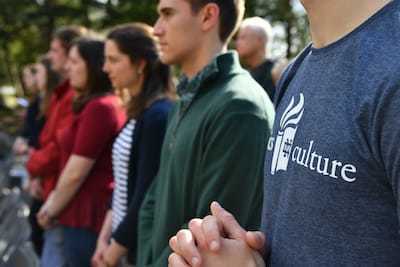Student Formation

At the de Nicola Center for Ethics and Culture, we believe our student formation efforts lie at the intersection of Blessed Basil Moreau’s pedagogy that “the mind will not be cultivated at the expense of the heart” and Father Edward Sorin’s vision that Notre Dame is called to be a “powerful force for good in the world.”
We believe that integral human formation in the Catholic tradition—in this case, integral student formation—rests in the conviction that human persons are made in the image and likeness of God, and that their final end is communion with God. This theological anthropology understands human persons to be endowed with a rational nature, to be naturally inclined toward the transcendent, and to be nourished most fully through participation in the life of the Catholic Church.
This conviction is informed by three fundamental commitments:
1. Integrity informed by virtue: The human person is a unified being of body and soul created in the image and likeness of God whose final end is communion with God—as such, we are called to develop and habituate virtues that allow for the fullest expression of our personhood across all activities of our private and public life.
"Unless there is a telos which transcends the limited goods of practices by constituting the good of a whole human life, the good of a human life conceived as a unity, it will both be the case that a certain subversive arbitrariness will invade the moral life and that we shall be unable to specify the context of certain virtues adequately...There is at least one virtue recognized by the tradition which cannot be specified at all except with reference to the wholeness of human life—the virtue of integrity...This notion of singleness of purpose in a whole life can have no application unless that of a whole life does" (Alasdair MacIntyre, After Virtue, 202).
2. Fidelity informed by the Heritage of the Catholic Faith: Out of gratuitous love, Jesus Christ safeguards the fullest expression of God’s Revelation in the Catholic Church — and, through the exercise of faith and reason, human persons can apprehend truths about our individual and shared humanity in such a way to illuminate principles that affirm human dignity and advance the common good.
“The Catholic Church’s Magisterium exercises the authority it holds from Christ to the fullest extent...and for the people who unfailingly adhere to this faith, it penetrates more deeply with right judgement and applies more fully in daily life” (Catechism of the Catholic Church, cf. 74–100).
3. Charity inspired by Truth: Integral human formation and charity are not possible without a commitment to truth, which is an “exacting and indispensable” form of charity.
“Charity in truth, to which Jesus Christ bore witness by his earthly life and especially by his death and resurrection, is the principal driving force behind the authentic development of every person and of all humanity” (cf. Benedict XVI, Caritas in Veritate, 1–2).
To this end, a common commitment to the relational character of human flourishing, the enduring wisdom of the Catholic moral and intellectual tradition, and the exercise of a steadfast posture of charity in truth serves as the means by which students, professionals, and the faithful might pursue and bear the personal and cultural fruit of truly integral formation.
The Sorin Fellows Program is the de Nicola Center’s dedicated student formation program through which students can participate more directly in the life of the Center and pursue truly integral formation in the Catholic tradition.
